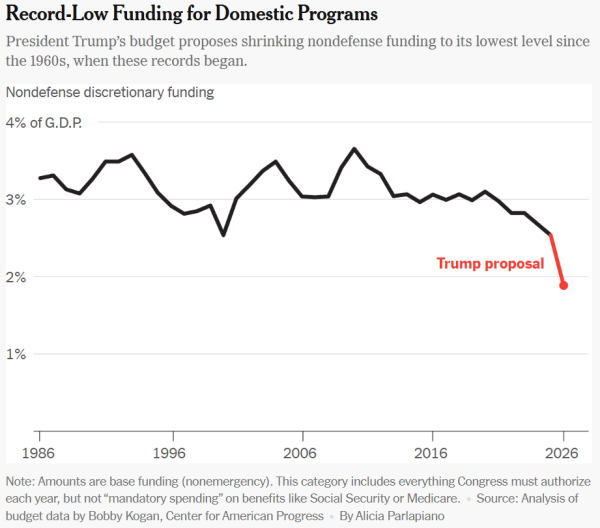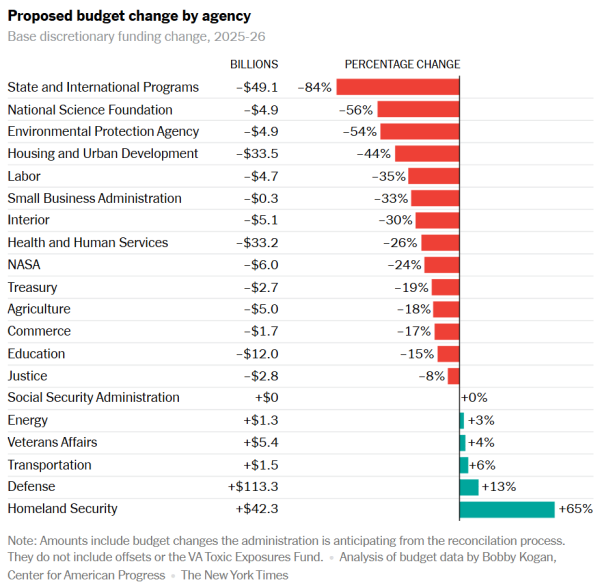
The White House on Friday proposed a fiscal year 2026 budget that would cut spending by $163 billion, with steep reductions to non-defense spending offset by an increase in outlays for defense and homeland security.
The proposal calls for a 22.6% cut to non-defense programs, including sharp reductions to funding for health, science, climate, education and housing. It would increase defense spending by $113.3 billion, or 13%, raising the annual total to more than $1 trillion. Homeland Security would receive $42.3 billion more for next year, a 65% increase that factors in another $175 billion in additional multiyear budget authority to fund the Trump administration’s immigration crackdown and deportations. In all, discretionary spending would be cut by nearly 8% to just under $1.7 trillion (see the New York Times charts below).
"At this critical moment, we need a historic budget — one that ends the funding of our decline, puts Americans first, and delivers unprecedented support to our military and homeland security," White House Office of Management and Budget Director Russell Vought said in a statement.
The White House outline, known as a “skinny” budget, was sent to Congress by Vought’s office, with a fully fleshed out fiscal plan for 2026 still to be delivered. Even so, the details in the proposal make clear it is a continuation of the Trump administration’s assaults on the federal bureaucracy, diversity programs and efforts to combat climate change. The non-defense discretionary portion of the budget would be scaled back to the lowest level since 2017. The proposed cuts come as Trump and congressional Republicans are working to permanently extend their 2017 tax cuts and potentially enact new tax breaks — changes that would add trillions of dollars more to the $36 trillion national debt.
In a letter to Senate Appropriations Committee Chair Susan Collins, Vought said that the new plan resulted “from a rigorous, line-by-line review of FY 2025 spending, which was found to be laden with spending contrary to the needs of ordinary working Americans and tilted toward funding niche non-governmental organizations and institutions of higher education committed to radical gender and climate ideologies antithetical to the American way of life.”
Vought added that the administration also looked at whether services would be better provided by state or local governments.
Among the most notable proposed cuts:
* The Department of Health and Human Services would see more than $33 billion in cuts, a 26% reduction. The National Institutes of Health would lose $18 billion while the Centers for Disease Control and Prevention budget would be slashed by about $3.6 billion. “NIH has broken the trust of the American people with wasteful spending, misleading information, risky research, and the promotion of dangerous ideologies that undermine public health,” the White House budget document claims.
The Trump administration says it will streamline and refocus these agencies to better align with the president’s priorities and executive orders. The budget would also provide $500 million for HHS Secretary Robert F. Kennedy Jr.’s signature Make America Healthy Again initiative.
* The Low Income Home Energy Assistance Program (LIHEAP) would be eliminated to save $4 billion. The White House says it will “instead support low-income individuals through energy dominance, lower prices, and an America First economic platform.”
* The Department of Housing and Urban Development would also lose more than $33 billion, a nearly 44% reduction from 2025 levels. Rental assistance programs for low-income families and others would be slashed by nearly $27 billion.
* The State Department and international programs would lose about 84% of their funding.
* Funding for the Internal Revenue Service would be reduced by about $2.5 billion. “The Budget ends the Biden Administration’s weaponization of IRS enforcement, which targeted conservative groups and small businesses,” the White House letter said. “The elimination of certain complex tax credits and technology improvements would increase IRS efficiency. The reduction would protect functions in Taxpayer Services.”
* Department of Education spending would be reduced by $12 billion, or more than 15%.
* More than $15 billion in Infrastructure Investment and Jobs Act funding related to climate change and renewable energy would be canceled and more than $3 billion in other Department of Energy climate and science-related programs would be cut along with another $1.3 billion from the National Oceanic and Atmospheric Administration.
* The FBI would lose $545 million as Trump and his administration take aim at what they call the “weaponization” of the law enforcement agency and “pet projects” of the Biden administration.
* The Environmental Protection Agency would see a 55% cut, losing $5 billion in funding.
* Funding for the National Science Foundation would be slashed by 56%, from $8.8 billion to $3.9 billion.
Key Republicans push back: The Trump plan gives Republicans controlling both chambers of Congress a framework to work with as they begin crafting annual spending bills. House Speaker Mike Johnson praised the plan as a “bold blueprint” that “makes clear that fiscal discipline is non-negotiable.” But congressional appropriators make their own choices on spending and some key Republicans have already raised objections to elements of the Trump request, including calls for even greater defense spending.
Collins, the top Republican appropriator, was cool to the president’s plan. “The President’s Budget Request is simply one step in the annual budget process,” she said in a statement. “This request has come to Congress late, and key details still remain outstanding. Based on my initial review, however, I have serious objections to the proposed freeze in our defense funding given the security challenges we face.” She also objected to the cuts for biomedical research and elimination of programs like LIHEAP. “Ultimately, it is Congress that holds the power of the purse,” she noted.
Sen. Roger Wicker, the chairman of the Senate Armed Services Committee, complained that the president’s request relied on $150 billion in supplemental Pentagon funding from Republicans’ budget reconciliation bill, currently being drafted, to increase defense spending rather than asking for an increase in the military’s base budget.
“President Trump successfully campaigned on a Peace Through Strength agenda, but his advisers at the Office of Management and Budget were apparently not listening,” Wicker said in a statement. “OMB is not requesting a trillion-dollar budget. It is requesting a budget of $892.6 billion, which is a cut in real terms. This budget would decrease President Trump’s military options and his negotiating leverage.”
Sen. Mitch McConnell, the former Republican leader in the Senate, offered similar criticism. “Make no mistake: A one-time influx reconciliation spending is not a substitute for full-year appropriations,” he said. “It’s a supplement.”
The administration reportedly believes its approach to defense funding is the best way to avoid having a standoff with Democrats, who typically have called for increases in non-defense spending on par with those for defense.
Democrats raise alarms: Democrats blasted Trump’s proposal, which they warned would gut vital programs. “Donald Trump’s days of pretending to be a populist are over. His policies are nothing short of an all-out assault on hardworking Americans,” Senate Minority Leader Chuck Schumer said in a statement. “As he guts healthcare, slashes education, and hollows out programs families rely on— he’s bankrolling tax breaks for billionaires and big corporations.”
Sen. Patty Murray, the top Democratic appropriator, said the Trump plan would hurt families, abandon the nation’s global leadership role and set it back decades. “This president believes we should shred at least $163 billion in investments here at home that make all the difference for families and have been essential to America’s success—but that we should hand billionaires and the biggest corporations trillions in new tax breaks,” she said in a statement. “That is outrageous—and it should offend every hardworking American.”
Correction: This article originally said that the $163 billion in proposed spending cuts were partially offset by the increases to defense and homeland security, but the planned spending boost on the latter two categories from the Republican budget reconciliation package fully offsets the cuts.

